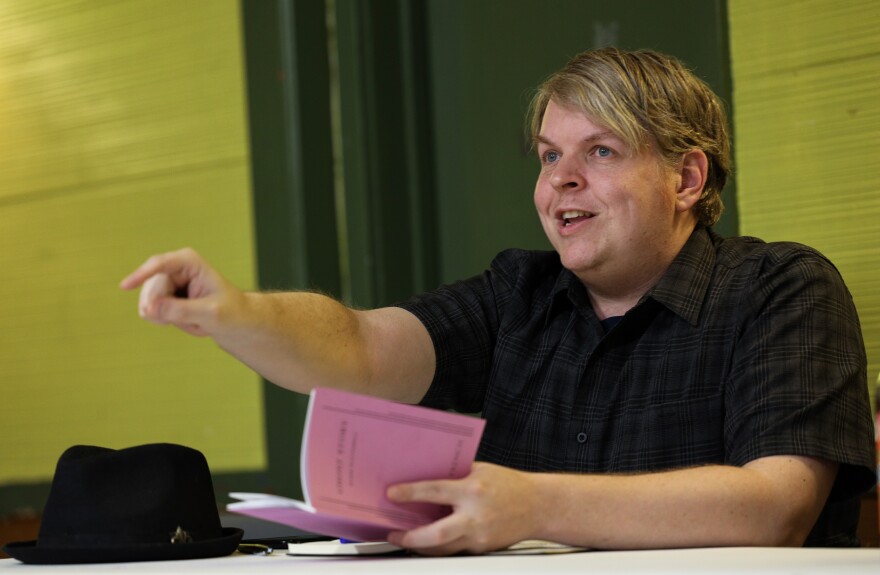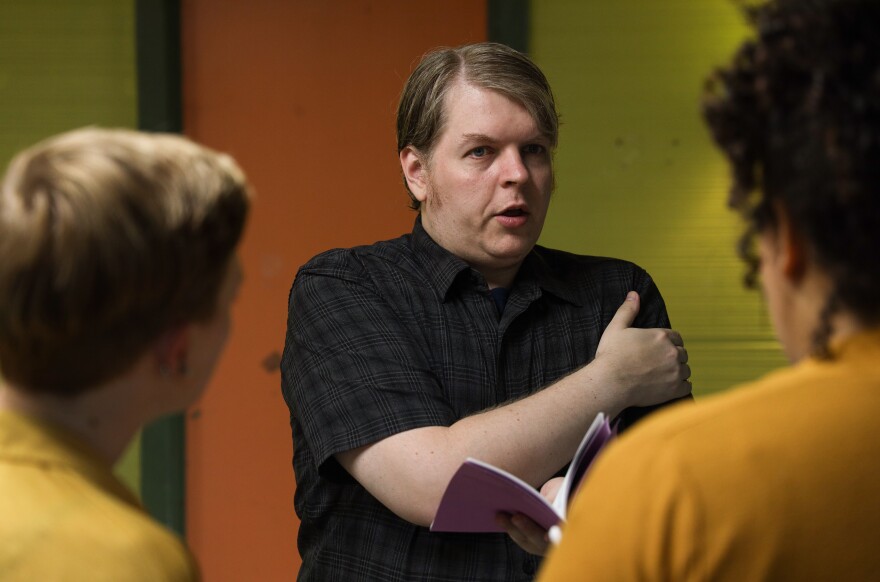Justin Rielly is an actor, director, producer and writer. Many of his theater pieces turn up at Rochester’s Multi-use Community Cultural Center -- the old church, converted into a theater, on Atlantic Avenue. That is who he is.

He also has Asperger’s syndrome, what he says is increasingly defined as “a part of the autism spectrum.”
Anne Loyster draws and paints. And she sings, songs such as Leonard Cohen’s “Hallelujah.” That is who she is.
She also has cerebral palsy and uses a wheelchair to navigate through the assisted living facility where she lives in Canandaigua.
Race Eberhardt is an actor. That is who he is.
He also has Down syndrome.
WXXI News has gathered the trio for Dialogue on Disability Week, a partnership between WXXI and Al Sigl Community of Agencies, in conjunction with the Herman and Margaret Schwartz Community Series. They will all appear on “Inclusion Desk Forum: The Arts.”
Loyster and Eberhardt will be telling their stories at 2 p.m. Wednesday on the live Facebook broadcast, which you’ll find on the WXXI News Facebook page. Even though Rielly has to work then, we recorded an interview with him last week, so you’ll see him as well. And if you miss the live event, you can catch up to it at your leisure, since it will remain posted on Facebook.
We met Loyster, who lives in a group home in Canandaigua, through Cobblestone Arts Center in Farmington; one part of its mission is to offer arts programs for adults with disabilities. In another video aspect of this Facebook talk, we see Loyster showing off her artwork; she has kind of a Cubist sensibility. And she’s singing. “It opens my brain,” she says. “And I feel happier.”
Eberhardt lives with his parents in Fairport. This summer, he’ll be starring in “Strait Undercover,” described by its creators as “the world’s first action-comedy feature film starring a person with special needs.” It’s being shot by Rochester’s Fish & Crown Creative, which defines itself as “a boutique video and photography production company.” Eberhardt had previously appeared in Fish & Crown’s conspiracy-theory laden TV pilot, “Kodeklan.” In the trailer for “Strait Undercover,” we see him playing Race Strait, a spy called out of retirement for one more job.
He even gets a fight scene.
So, we have three people whose lives are not only a collective spectrum of the arts -- film, painting, theater -- but who represent a wide range of disabilities. For his part, Rielly shrugs off the suggestion that holding down a full-time job during the day and spending his evenings creating theater is -- as I awkwardly put it during the interview we did with him last week -- “extraordinary.”
“I guess it’s just the way I function,” he says.
Nothing to see here, folks. Onstage, there’s plenty to see.
Most recently, Rielly directed a play, “Ghost Story,” for last fall’s Rochester Fringe Festival. Coming up at MuCCC, he’s producing “The Vagina Monologues” for a four-night run beginning Feb. 24.
The show, of course, calls for a female director and all-woman cast. Rielly has included in that cast Penny Sterling, a transgender woman who has become a familiar sight on Rochester stages. Is this subversively brilliant? A demonstration of how our attitudes toward sexual identity have matured? Or is it a producer getting the chance to work with a performer they have long admired?
Rielly was initially diagnosed with Asperger’s when he was about 25 years old. But looking back now, he suggests it had manifested itself as early as when he was 5 or 6. “For whatever reason, I just didn’t want to hang around the other kids,” he says. “And it was a natural thing, I just wanted to be by myself. And I know it got me picked on by kids later on in life and through school.
“I wasn’t socially connecting,” Rielly says. “Or I wasn’t socially connecting, with my peer group.”
Clarity did come with the diagnosis of Asperger’s, generally described as a neurodevelopmental disorder that can make socializing with others difficult.
And clarity came through a father who said, “I love you the way you are….”
Followed by a typical dad refrain…
“And by the way, how’s your car?”
So how does the Asperger’s syndrome affect Rielly?
“When you’ve got a lot going on in your head, the wiring feels different,” he says.
“I remember writing in a play, a character had a line where they would say, ‘The wiring is sometimes different, but the plug still plugs in somewhere.’ So, I still work. I still live. I still function. And so these, there are moments, when my mind can have so many different things going on, and you’re trying to figure out: how am I supposed to get through this? Is there clarity here? What do I do, what do I do? But there were moments afterward, you get through on the heart of what you’re doing, and there’s the calmness to it.”
And the intensity?
“I don’t like doing anything half-full, half-empty,” Rielly says. “I want to give everything I can, in whatever I’m doing, whether it’s work or theater or being with people I love. My family, my friends, I want to be there for people.”
The MuCCC is a perfect fit for Rielly.
“Because it’s such a small theater, there is that wonderful feeling of intimacy,” he says.
“Sometimes you feel like you’re a fly on the wall to the stories that are going on.”
It was at MuCCC that Rielly met the man who would help him unleash his inner theater. John Borek, who died last year, was the artistic director at MuCCC for about a decade. Rielly submitted his own work. One play was a reflection on his high-school days, “When We Were Young, We Wanted to Live.” Borek liked it, and suggested Rielly’s style reminded him of the spoken-word pieces by Spalding Gray.
And with that, Rielly began performing some of Gray’s monologues. “Swimming to Cambodia” is the signature piece. It’s a relentless stream-of-consciousness retelling of the small acting role that Gray had in the 1984 film “The Killing Fields.” In “Swimming to Cambodia,” Gray ruminates about filmmaking and some of the edgier aspects of Cambodian culture, namely drugs.

Rielly does not do the easy stuff. “My Fair Lady” is not on the radar of his one-man theater company, Aspie Works. “It would be hard for me to find Victorian-era gowns,” he says.
Rielly says that with furrowed brow: It’s hard to tell if he’s joking, or serious.
Either way, he’s probably right.
By the time Rielly found him, Gray was dead. But the writer’s widow, Kathleen Russo, had been contacted through a mutual friend. And in 2015, she came to Rochester to see Rielly bring “Swimming to Cambodia” to life.
He met her before the show. She gave him a copy of one of her husband’s books. “In the book, she had signed it, to basically say, ‘Thank you for keeping Spalding’s work alive,’” Rielly says. “I mean, if that’s not a vote of confidence, I don’t know what is.”
Then it was showtime. Rielly took the stage. He set the script on a podium, opened it and looked at his audience.
“And Kathy was literally sitting right in the middle of the audience, and I saw her face, and she had that face of … ‘You can do this, you’ve got this.’ And as soon as I saw her face, I just honed in on that. And I just did the monologue, I just did it start to finish. If I looked at that script, it must have been for a moment or so.”
And as for Russo, amazingly, “It was the first time she had seen ‘Swimming to Cambodia’ in its entirety,” Rielly says. “And it was someone else.”
Yes, he does that entire, 75-minute monologue from memory. Is that same focus that allows him to memorize all Academy Awards Best Picture winners from 1927 a product of the Asperger’s syndrome?
“I think that’s certainly a possibility,” Rielly says.
And quite frankly, opening yourself up to a bunch of strangers, which Dialogue on Disability is, is not easy.
“Yeah, this is a lot tougher than I thought,” Rielly says as he struggles to assemble this final thought:
“But it’s good, also, that there are platforms like this, where people can talk about these things. And I know there are other people in the autism spectrum who, A, I hope this forum benefits them. And B, it also provides an opportunity for people who are also on the spectrum, hopefully somewhere down the line, they can get their work noticed.”
9(MDAzMDk3ODE0MDEyMzUwNzM0NzEyNDVkOA001))
Copyright 2022 WXXI News



